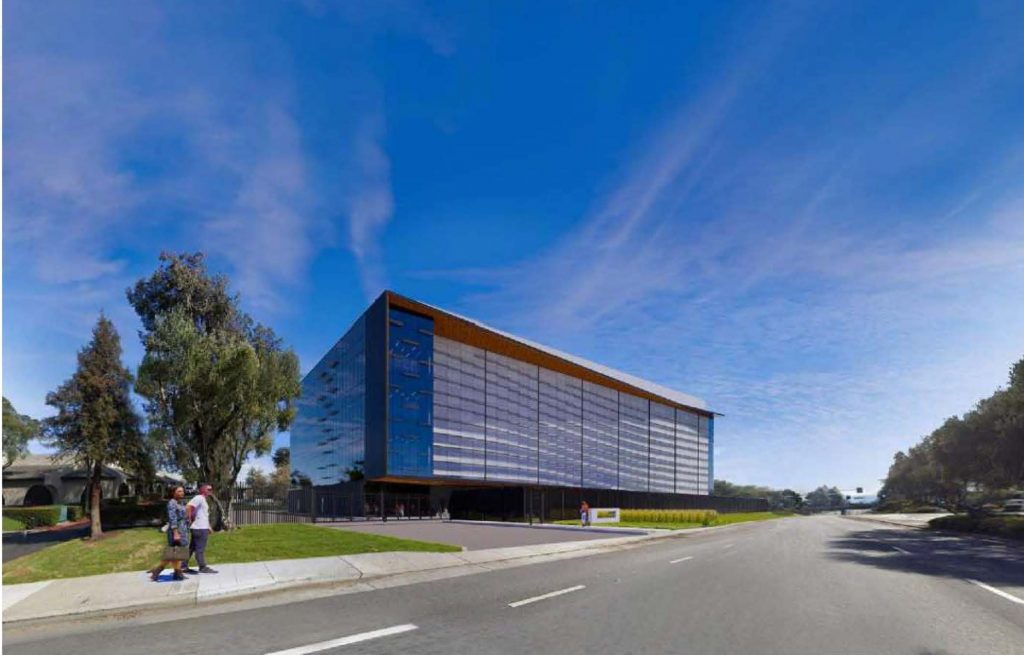The Santa Clara Planning Commission took a stand against data centers on March 6, refusing to approve a conditional use permit for 2805 Bowers Avenue. The permit would have allowed the developer to knock down a two-story building on the property and build a new four-story data center.
Two of the seven members of the Planning Commission, Eric Crutchlow and Qian Huang, were not present at the meeting. Still, the petitioner chose to continue with the hearing. The remaining five commissioners were split on the issue.
“On balance, we’re better with this project than without and it’s not just because I think, ‘Yay, we’re going to get money into the general fund,’ because it isn’t always about money,” said Commissioner Nancy Biagini, who supported the project. “I think, on balance, the fact that you went ahead and had a much more comprehensive [meeting] with the neighbors [and] took a lot of things into consideration that I don’t think previous data centers did.”
Commissioner Lance Saleme said that while, personally, he despises data centers, he could not allow his philosophical issues to overshadow the project itself.
Commissioner Mario Bouza was one of two commissioners who voted against the project. He felt like the City needs more businesses like Nvidia or Intel that will bring more people into the area for work and “unity to our city.”
Commissioner Priya Cherukuru also voted against the data center project.
“It’s [data centers] just spreading so rampantly that we need to call it out, and that’s the reason for my ‘no’ vote,” said Cherukuru.
She also mentioned that Digital Realty, which was mentioned as a partner in the project, already has 10-plus data centers in the area and won’t feel a significant impact as a result.
Moments after the comment, the petitioner, GI Partners, approached the podium to say Digital Realty is no longer a partner and GI Partners did not have a data center in Santa Clara.
The petitioner has seven days to appeal the ruling to the City Council.
The item was initially heard at the Jan. 31 Planning Commission meeting, where the petitioner was told to do more public outreach. The developer sent notices out to people within a 2,000-foot radius of the property as well as local schools and daycares. It also held a community meeting that approximately 15 people attended.
Community members asked questions about power and water use, noise and revenue. The project was expected to use about 72 MW of power and would only generate its own power when using the backup emergency generators. It will not use any more water than what the previous occupant used.
One community member, Teresa O’Neill, spoke at the Planning Commission meeting to impress upon commissioners the importance of data centers to Santa Clara.
“I think we need to realize that, actually, Santa Clara has been very blessed that we’ve been able to welcome a lot of these data centers to our city,” said O’Neill, who outlined that many cities are dealing with vacant industrial areas and Santa Clara is lucky to have businesses that want to occupy those areas. “We don’t want to have a lot of data centers relocate now because they’re such a key part of our tax base.”
324 Madison St. Will Expand
The Planning Commission recommended that the City Council approve a plan to expand a single-family home at 324 Madison St. The home falls under the Mills Act, which limits some of the potential remodeling because of its historical nature.
The resident wants to make the basement habitable and add 500-plus sq. ft. to the first floor. They would not change the exterior of the home.
They also want a detatched two-car garage so they can work on cars. The garage is a foot higher than code, so he can add a lift if he wants.
The Historical and Landmarks Commission (HLC) recommended the plans for approval with minor changes. The applicant had made the changes before bringing it to the Planning Commission.
The commission unanimously recommended the plan for approval by the City Council.
Other Planning Commission Business
The Commission unanimously agreed to excuse Crutchlow and Huang from the meeting.
The commissioners gave a recap of the State of the Valley and their experiences at the event.
Saleme lamented the accessibility of the location, specifically for a person of limited mobility like himself. He said getting there was too difficult so he tried to dial in remotely. That had its own problems and he could not attend the first hour because of technical issues.
He also mentioned that the South Bay’s income disparity continues to grow.
Yashraj Bhatnagar took note of the RHNA numbers, which showed that medium-income home development has grown at a 200% construction rate while lower-income homes have only grown at a 50% rate.
He was happy to see that low-income and very-low-income building rates have improved.
Cherukuru said the homelessness number dropped by about 1,000 people. Bhatnagar felt a dotted line correlation could be drawn between the area’s homelessness and the creation of below-market-rate housing.
Cherukuru said job loss has now become the leading cause of homelessness in the valley.
All of the commissioners wished there was less focus on tech and more focus on other issues like healthcare, retail and commercial vacancies.
The next scheduled meeting of the Planning Commission is Wednesday, April 24, 2024.
Related Posts:
Santa Clara’s Data Drain
Santa Clarans Bear the Cost of the Bay Area’s Cloud Storage
Data Center Blurs Line Between Residential and Industrial
